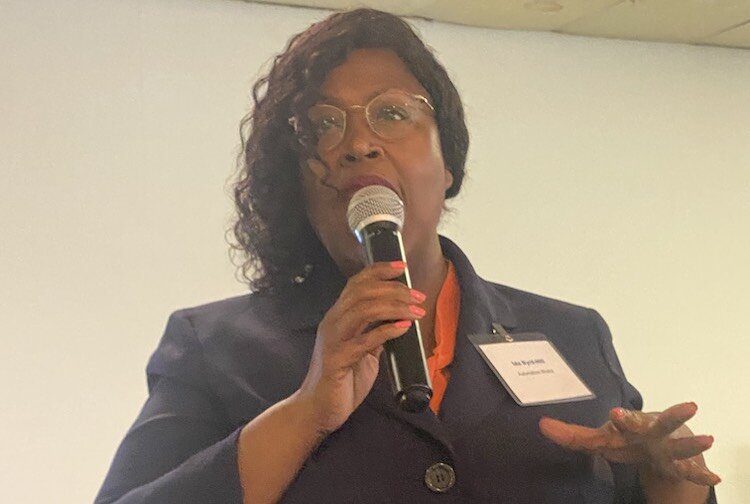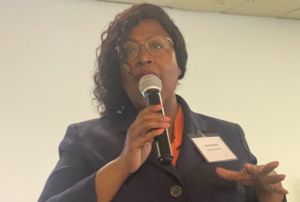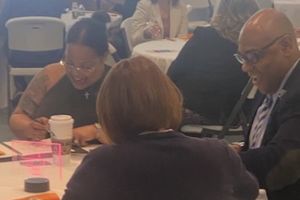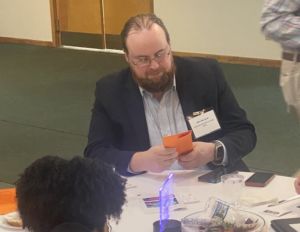
Editor’s note: This story is part of Southwest Michigan Second Wave’s On the Ground Battle Creek series.
Ida Byrd-Hill knows that she’s an anomaly in the world of high-tech.
As an African American woman and CEO of the Detroit-based Automation Workz, she is focusing on an initiative designed to get more Black people into technology careers and bridge the gaps employers are seeing in unfilled industrial technology jobs. Automation Workz is a top 10 ranked U.S. cybersecurity boot camp, known for certification training that is leading low-income, women and people of color to high-paying tech careers.
On Wednesday, she convened a group of 30 individuals representing higher education; nonprofits; businesses; churches; and economic development entities throughout the West Michigan region who will serve on the West Michigan African American Tech Readiness Collaborative. Among the Calhoun County-based representation are Kellogg Community College, Denso, Battle Creek Unlimited, New Level Sports Ministries, and Washington Heights United Methodist Church.
The gathering featured a keynote speech titled, “Can the Battle Creek region become a NSF Innovation Engine?” by Allen Walker, Senior Advisor to the U.S. National Science Foundation’s newly established Directorate for Technology, Innovation and Partnerships (TIP). In this position, Walker focuses on potential partnerships through engagement with stakeholders across government, academia, industry, and nonprofits. He also advises directorate leadership on research and development strategy and policy. He acts as the TIP chief of staff supporting the assistant director.
“I believe a unified Battle Creek/ Kalamazoo/Grand Rapids/Benton Harbor/Jackson region could become a major Industrial Tech Hub – an NSF Innovation Engine,” Byrd-Hill says. “This West Michigan region is attracting all sorts of tech employer investments, like the Ford-CATL Battery plant in Marshall, LG Energy Solutions expansion in Holland, and the Gotion Semiconductor plant in Mecosta County. As the CEO of a tech startup, I see the Michigan information technology cluster replicating the 22% growth it experienced over the past 10 years.”
However, that previous growth spurt did not translate to job opportunities for African Americans. The Michigan Information Technology Industry Cluster Workforce Analysis for 2022 highlights that African Americans comprised only 7.6% of this workforce, while they make up 14% of the general population.
Ida Byrd-Hill, CEO of the Detroit-based Automation Workz, speaking at the convening of the West Michigan African American Tech Readiness Collaborative.
“I launched the West Michigan African American Tech Readiness Collaborative to ensure this region continues its tech job growth by ensuring everyone is involved in reskilling/upskilling for high-paying jobs within the broader tech markets, including battery/electric vehicles, healthcare, manufacturing, and semiconductors,” Byrd-Hill says.
The decision to hold the Collaborative’s kickoff in Battle Creek was intentionally done because of its location.
“Battle Creek sits in a very interesting space. It’s halfway between Ann Arbor and Chicago and we think of this area as a tech corridor and Battle Creek sits right in the middle. Employers here have the opportunity to reach out east or west and the city serves as an anchor to the north/south corridor, but people don’t see it that way. It’s technically an anchor, but it’s not seen as an anchor. When companies start to build semi-conductor and battery plants, they’re going to come to West Michigan because you have the availability of virgin lands,” Byrd-Hill says.
The work of the Collaborative is being funded through a $150,000 contract with the W.K. Kellogg Foundation. Byrd-Hill says they weren’t eligible for a grant because the group is not a nonprofit. The WKKF funds will cover the cost of five surveys that will be part of a feasibility study. Those surveys will take a deeper dive into assessing employers’ automation and technology needs; taking an inventory of training available in communities; assessing the tech skills that African Americans have and the barriers they encounter to accessing those careers; and gauging the interest of African Americans in tech careers.
While saying that no one can assume that every African American will want a career in the tech sector, Byrd-Hill says it’s crucial to expose African American students early on in their schooling to this as a viable employment option.
“It starts with K-12. You’ve got these schools, but the vast majority of people of color are not even taking computer programming classes that are offered. If you’re not exposed to this, you’re not going to focus on it. Technology has a very high dependence on math and if you’re not taught those skills it makes it difficult to pick up as an adult,” she says.
The dilemma, she says, is that math and the sciences are cumulative subjects that build on top of each other.
“If you’re not good in math in middle school, you won’t do it in high school, and you shut the door to potential careers in the tech industry. Technology has invaded every industry. If you cut yourself off from science, math, or technology, you’re going to say you’re not going to work or you take low-level jobs. When you’re younger there are opportunities to recoup that and start over, but then you might be too embarrassed to start over and you’re afraid of the math and people don’t want to make fools of themselves.”
Over 30 gathered at the West Michigan African American Tech Readiness Collaboartive convening on Wednesday.
One of the driving forces behind the Collaborative is to give people opportunities to raise themselves out of poverty and get them into good-paying jobs so that they can support themselves and their families. The focus is on individuals 18 and older.
Pastor Monique French who leads Washington Heights UMC says this is the reason she wanted to be a member of the Collaborative. She says African Americans many times don’t have access to jobs or the information about where to get the training to increase their skill set.
“I always believe in trying to bring resources and things to the community. I’m hoping that this will be an opportunity for people to get great paying jobs and enable their skill set to be developed in those areas and get the necessary training that they need,” French says. “This is a great opportunity to bridge that generational wealth gap.”
About 92 percent of those taking certification training at Automation Workz are African American with the remainder evenly split between Hispanic, Arabic, and white. The training for the majority of these students is paid through workforce development dollars from the State of Michigan.
Byrd-Hill says one of her students came out of the program making $130,000 a year and 30 percent of her students are making six-figure incomes.
“It’s hard work but it’s doable and you don’t have to have a degree. Tech is changing so fast and is flexible in its educational requirements,” she says. “You may have gone to a four-year institution and gotten a degree, but you likely didn’t get the skills to take a job in the tech sector. During the 20th Century, people got a degree and went into middle management. In the 21st Century, you have to have skills in science, and math to take these jobs. We can’t make the assumption that just because they got a degree, they are technical experts.”
She says many people who earn a Bachelor of Arts degree get certification in some area of technology because they know that these are skills they will need to advance in their chosen career or pivot into another job.
Ida Byrd-Hill, CEO of the Detroit-based Automation Workz, speaking at the convening of the West Michigan African American Tech Readiness Collaborative.
After earning a degree in Economics from the University of Michigan, Byrd-Hill says she worked for the former First of America Bank as a check filer at a time that job was done manually. When the bank decided to automate its check filing work, she let them know she could work on the project because of her background in COBOL (Common Business-Oriented Language).
She says her degree and background in COBOL enabled her to speak the language of business people and technology.
“Business people don’t speak the same language as tech people and I served as a liaison between the two. I was interpreter to both sides,” she says. “I evolved out of the tech industry and for me, that’s been my whole career. But you don’t see many people who look like me.”
Filling the talent pipeline locally
Corporate America would like to hire people from within a region their companies are located in, but if they can’t find the workers, they will go outside of that area to find them, Byrd-Hill says.
“We need to make sure everybody’s properly trained for the jobs that are coming,” she says.
Among the issues is that the technology piece of industrial manufacturing technology isn’t on the radar for most people.
“In West Michigan. you do a lot of manufacturing training. When manufacturing meets technology, that’s where industrial technology comes in. But the training has not shifted to the technology side of the plant. All of this industrial technology is occurring and you see the manufacturing, but you don’t see the technological side and that’s growing like a weed and requires training,” Byrd-Hill says.
Over 30 gathered at the West Michigan African American Tech Readiness Collaboartive convening on Wednesday.
She says the Federal government has recognized this as a problem and is making millions of dollars available to find solutions.
“My hope is that the West Michigan region will qualify for one of these funding streams to make the collaborative permanent. We have the opportunity to get $75 million over a 5-year period and the collaborative also has an opportunity to compete for a National Science Foundation grant that would be $160 million over 10 years.”
This money would be used for research, training, bolstering laboratories at post-secondary institutions, or to drive innovation in the region, workforce development, and entrepreneurial pursuits.
“The Feds are offering a lot of latitude for what happens in a region,” Byrd-Hill says.
The Collaborative is expected to issue a final report on its findings based on the survey results in February 2024.
Byrd-Hill says the work being done is designed to give people hope for a better life if they’re in poverty and give them opportunities to access these tech jobs to get out of poverty.
“This is really the reason why we brought this collaborative together,” she says. “The jobs are out there, but people have to be ready for it.”



